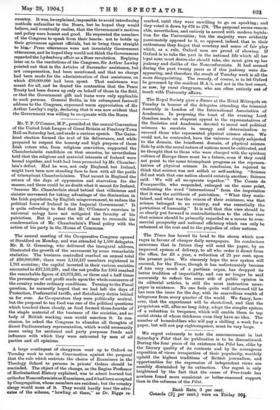The Royal Society gave a dinner at the Intel Metropole
on Tuesday in honour of the delegates attending the triennial Assembly in London of the International Association of Academies. In proposing the toast of the evening Lord Goschen made an eloquent appeal to the representatives of the Societies and Academies devoted to moral and political sciences to emulate in energy and determination to succeed those who represented physical science alone. We could not, he contended, have the universe simply subjected to the domain, the beneficent domain, of physical science. Side by side the moral nature of nations must be cultivated, and he thought that to those who were charged with the spiritual culture of Europe there must be a future, even if they could not point to the same triumphant progress as the represen- tatives of physical science. In conclusion, he rejoiced to think that science was not selfish or self-seeking. "Science did not wish that one nation should outstrip another; Science said: 'We will all co-operate together.' " The Comte de Franqueville, who responded, enlarged on the same point, vindicating the word " international " from the imputation that it was the antithesis of patriotism. "What they main- tained, and what was the reason of their existence, was that science belonged to no country, and was essentially the patriotism of humanity." It is well that this view should be so clearly put forward in contradistinction to the other view that science should be primarily regarded as a means to com- mercial prosperity and national efficiency which can only be enhanced at the cost and to the prejudice of other nations.






































 Previous page
Previous page